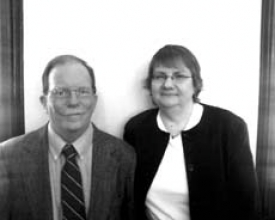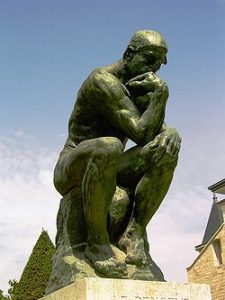
“Start Spreading the News” (Mark 1:40-45)
By Pastor Jeremy B. Stopford
TODAY’S “SPECIAL”:
“Quick Thinking”
A son challenged his boastful father to a game of golf. The son was determined to beat his father in golf for the first time.
On the very first swing, the father got a hole in one.
“Okay, nice shot dad,” said the son, thinking quickly on his feet.
“Now I will take my practice shot and then we will start.”
INTRODUCTION
We are entering the second message in our series on the Gospel of Mark, believed to be the first written of the four gospels.
Our theme is “The Servanthood of Christ” and our Theme Verse is Mark 10:45, ““For even the Son of Man did not come to be served, but to serve, and to give His life as a ransom for many.”
What would happen if we lived the rest of our days with the conviction and attitude that we are serving the Lord through the people and circumstances He allows in our every day? How would we do that? The Gospel of Mark is the adult life of the Lord Jesus. Note in Chapter 1 that there is no birth account, no genealogy. Mark simply begins where the Savior’s service time frame began – at His baptism. Is there a marker in your life for your walk with the Lord Jesus? Is there a time when you began to know Him as your Savior – and you decided to live the rest of your life for Him? There should be – and Mark shows us how the Lord Jesus did it!
Our lesson in Mark 1 centers on the last 5 or so verses, where in His early days of open ministry, our Savior makes a difference in one unusual person’s life.
PRAYER
# 1. THE POSITIONS OF SEEKING THE SAVIOR (v. 40)
A. The condition: leprosy
In verse 40, we’re introduced to a nameless man. All we know about him is that he is identified as “a man with leprosy.” That in itself says much. The disease is an auto-immune disease which affects all the extremities of the body. In its full course, all the parts of the body deteriorate and fall off – and that is before the victim even comes close to death.
ILLUSTRATION: I was close friends with a gentleman who ultimately died from the effects of Aids. Like leprosy, at first my friend got somewhat weak. And then parts of his body, both internally and externally, were affected. The biggest outward evidence was the deterioration of half his face. It was sad. Fortunately in his last days, he came to know Jesus as Savior.
The name “leprosy” brings with it only one cure: death. And as a condition, there was only one label which the Biblical society would place on the one with leprosy: “untouchable”. There was such a fear and stigma with this disease that victims were isolated well “outside the camp” in areas where they ultimately would die, their only hope. Our text tells of such an hopeless untouchable who did something drastic about his condition: he left the camp and came looking for hope.
B. The character
Note that the man with leprosy did four things:
1. He “came to Him” – He came to Jesus. Jesus was his last hope. In fact, he would find that in reality Jesus was more than his last hope – he was his only hope! He came to Jesus.
2. He “begged Him”. The idea is that he “implored, beseeched, pleaded”. The man with leprosy bowed down to Jesus, his only hope, and let Him know that He was his only hope.
3. He begged Him “on his knees”. This is a two-fold position. It is one of complete dependence upon another. Jesus was indeed his only hope. But it is also a position of… worship. He begged on his knees because he was doing more than simply asking for a favor. He was in essence letting the Savior know of his worship!
4. He verbalized his request: “if You are willing, You can make me clean.” We will hear this request at least one more time in the gospels. We’ll hear it in the Garden of Gethsemane, just before the Savior’s arrest, just before the cross, when the Savior had a passionate moment with His Father. Remember? He said, “not My will but Thine be done.”
The man with leprosy was surrendering to the Savior’s will.
How did the man with leprosy know about this? How did he know to come to Jesus? How did he know to plead with the Savior as his only hope? How did he know to worship Jesus alone? How did he know to verbalize his request? How did he know?
I think he knew because the Spirit of God was dealing with the inner hunger of his heart. Remember, the prophet Samuel, when seeking God’s direction for the anointing of the one who was to be the next king of Israel, said, “man looks at the outward appearance; God looks at the heart”. Yes, he was simply a leper. But this man with leprosy had a hunger, a hunger for truth, an unmet hunger for the eternal. He hungered for the Lord.
And that is how each of us comes to the cross! We come to the only one Who can meet the need: the Lord Jesus. We beg Him, our only Hope. We beg on our knees – we worship Him alone! And we verbalize our request: “if You are willing, you can make me clean.” Inside and out!
To everyone who might have been onlookers to this interaction with the leper and the Lord Jesus, they might have said, “well, there’s another hopeless cause. Who is this One Who should care? Doesn’t He know that this man is an untouchable? Why, he shouldn’t even be outside the camp!”
The situation was impossible. And so it is with every man, woman, boy, and girl who is lost without God and without hope. There needs to be an intervention in the downward spiral of hopelessness.
# 2 THE SAVIOR’S RESPONSE (vs. 41-44)
Note the Savior’s amazing response to the leper’s need:
A. He was “filled with compassion”. His entire being saw this man before Him through the eyes of the Father. Jesus saw him with eyes of love, mercy, grace.
B. Jesus “reached out His hand”. Simply put, He put love, mercy, and grace into action! He did more than just SAY “I love you.” He loved with the everlasting love of His Father. He showed ACTION. He reached out His hand.
C. And then? He TOUCHED THE MAN! Wouldn’t you have liked to have been in the crowd that day? You and all the others would be saying, “Hey Jesus, here’s an untouchable. Stay away from him. He’s no good!”
Maybe you’ve heard those same voices. “Hey, stay away from those people. They’re drunks. They’re addicts. They’re on welfare. They will never get out of their gutter. Don’t waste your time on them.” Or, “they’re so rich they don’t need the help of the church, much less of the Lord.” Untouchables. Jesus TOUCHED THE MAN!
D. His action and love flowed from the willingness of the heart. The Father is not willing that any should perish. And Jesus had such a willingness, too. He touched the man and said words of compassion, “Be clean!”
E. The next word is overwhelming: IMMEDIATELY. This is the key word of the Gospel of Mark. Look at this chapter alone: v. 10, v. 12, v. 18, v. 20, v. 21, v. 28, v.31, and now here in v. 42. In fact, 36 times in Mark the word “immediately” is used, more so than any of the other gospels! Remember, Mark emphasizes service. And Jesus introduced His being a Servant by showing IMMEDIATE response to need. He served. He didn’t wait. He didn’t think about all the consequences: “what will people think if I touch an untouchable? What will they think if I love the unlovely? What will they think if I show compassion to those who are simply abusers of the system? What will they think?”. No, He served. And so should we.
But the point is greater than that! When Jesus touched the man with leprosy, what happened? IMMEDIATELY the leprosy was gone. It left him. He was cleansed!
He had eternal life, as it were! And just as his physical cleansing was dependent upon the Savior’s touch, so is our eternal cleansing. Jesus said, “come unto Me all who are weary and heavy burdened, and I will give you rest.” He’ll touch you, too!
F. But there is one more note! Jesus didn’t leave the man of leprosy there! He did what? He sent him to the priest? To do what? To offer for ceremonial cleansing those things which Moses commanded, as a testimony to the priest. What did Moses command? Check out Leviticus 14! Having been determined by the priest that he has been cleansed of his leprosy, the former leper was to bring to the priest, among other sacrifices, two living birds. One was to be killed by the priest – a symbol of the death of the leprosy. Then the living bird was to be dipped in the dead bird’s blood and then released into the air – a symbol of the former leper having been brought to new life.
Why did the Savior request this? BECAUSE IT HAD NEVER BEEN DONE BEFORE! No one in the modern era had been healed of leprosy! No one had seen Someone like the Lord Jesus serve in such a way! No one! Don’t you think the priest would have been shocked when that one who was formerly a man with leprosy shows up a cleansed vessel, seeking the blessing of the priest? Wow!
Isn’t that what happens when we come to Christ by faith for salvation? When we trust Him, and only Him and His death, burial and resurrection as our only eternal “cure” for our position as sinner, like the bird that is killed, we, too, die to self. And then like the living bird who is dipped in the dead bird’s blood and then is allowed to fly off, we, too, are reminded daily that our salvation came through the blood of the Lord Jesus. Trusting in His provision, then we have the privilege to live the rest of our lives as free to live, to live for His glory!
What a great story!
CONCLUSION
The fruit of the touch of the Master (v. 45)
Isn’t it great that the story does not end there. The man with leprosy, the untouchable who was healed by the Master’s touch, was now as free as that living bird. He could live the rest of his life for the Savior.
But first he was to go to the priest.
BUT HE DIDN’T! HE STARTED “SPREADING THE NEWS”! Frank Sinatra, eat your heart out! He couldn’t hold within himself what the Lord Jesus had done. He had to tell everyone!
And so should we!
Close in prayer
Rev Jeremy B. Stopford, First Baptist Church, Earlville, NY
July 8, 2018









